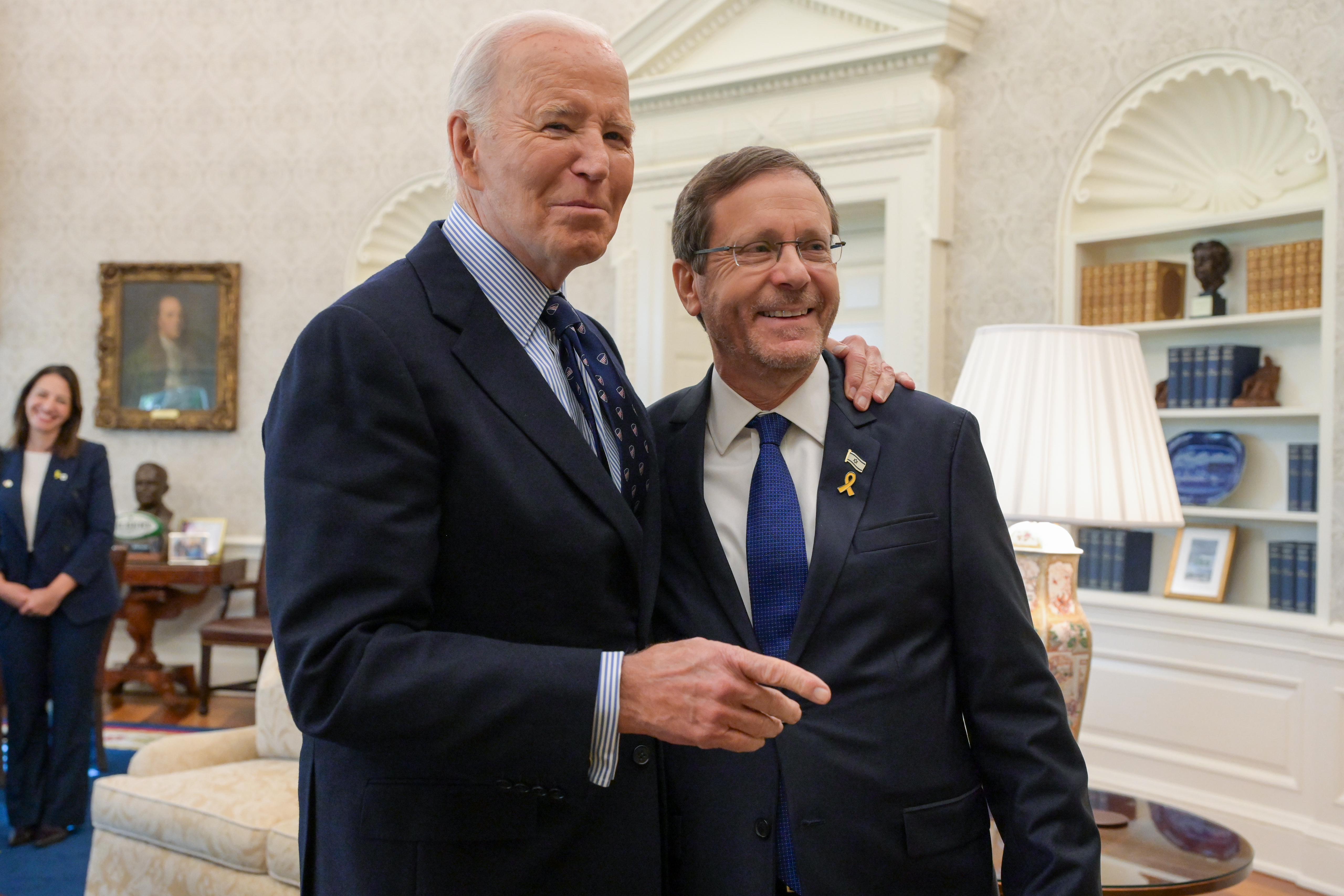1. Early Life
1.1. Family and Upbringing
Isaac Herzog was born in Tel Aviv, Israel, on 22 September 1960. He is the son of Chaim Herzog, who served as the Sixth President of Israel from 1983 to 1993, and Aura Ambache, the founder of the Council for a Beautiful Israel. His paternal grandfather, Rabbi Yitzhak HaLevi Herzog, was a distinguished religious leader, serving as the first Chief Rabbi of Ireland from 1922 to 1935, and then as the Ashkenazi Chief Rabbi of Israel from 1936 to 1959. Herzog's father was born and raised in Ireland, while his mother was born in Egypt; their families were of Eastern European Jewish descent, with roots in Poland, Russia, and Lithuania. He has two brothers and a sister. Additionally, Abba Eban, who served as Israel's third foreign minister, was his uncle.
When his father was the Permanent Representative of Israel to the United Nations for three years, Herzog lived in New York City and attended the Ramaz School. He also accompanied his father to visit the Lubavitcher Rebbe in Brooklyn.
1.2. Education and Military Service
While attending high school, Herzog pursued an advanced academic education at Cornell University and New York University. He spent his summers at Camp Ramah. At the end of 1978, he returned to Israel and enlisted in the Israel Defense Forces (IDF). He served as a major officer in Unit 8200 of the Israeli Intelligence Corps.
1.3. Legal Career
Following his military service, Herzog pursued a legal education, studying law at Tel Aviv University. After completing his studies, he joined the law firm Herzog, Fox & Ne'eman, which had been founded by his father. He practiced law there prior to his entry into the political arena.
2. Political Career
2.1. Knesset Member and Ministerial Posts
Although he was unsuccessful in the 1999 Israeli legislative election, Herzog served as the secretary of the government in Ehud Barak's cabinet from 1999 to 2001. During this period, he was investigated in connection with the "Amutot Barak" scandal, which involved allegations of violations of party funding laws. Herzog maintained his right to silence, and the Attorney General ultimately closed the case against him due to a lack of evidence. From 2000 to 2003, he served as the chairman of the Israel Anti-Drug Authority.
Herzog successfully won a seat in the 2003 Israeli legislative election as a member of the Israeli Labor Party. On 10 January 2005, when Labor joined Ariel Sharon's coalition government, Herzog was appointed Minister of Housing and Construction at his request. However, he resigned from this cabinet post on 23 November 2005, along with the rest of his party, when Labor left the coalition.
Prior to the 2006 Israeli legislative election, Herzog secured second place on the Labor Party's list in the primaries. He was initially appointed Minister of Tourism in Ehud Olmert's Kadima-led coalition. In March 2007, he was reassigned to the Social Affairs ministry after Yisrael Beiteinu joined the governing coalition and was awarded the Tourism Ministry. He was also appointed Minister of the Diaspora, Society and the Fight Against Antisemitism at this time. He again placed second on the party's list for the 2009 Israeli legislative election. Following that election, he was appointed Minister of Welfare and Social Services and Minister of the Diaspora. In January 2009, Prime Minister Ehud Olmert appointed him as the Israel Government Coordinator for the provision of humanitarian aid to the population of Gaza. He later resigned from the cabinet in January 2011 after Ehud Barak left the Labor Party to establish the Independence party.
2.2. Opposition Leader and Labor Party Chairman
In 2011, Herzog was an unsuccessful candidate for the Labor Party leadership, finishing third in the primaries behind Shelly Yachimovich and Amir Peretz. However, on 22 November 2013, he was elected leader of the Labor Party, defeating incumbent Shelly Yachimovich by 58.5% to 41.5%. This victory also made him the Leader of the Opposition. While Yachimovich had focused primarily on socioeconomic issues, Herzog prioritized security and the resolution of the Israeli-Palestinian conflict. Ten days after his election as party leader, Herzog met with Palestinian President Mahmoud Abbas to affirm his support for the two-state solution. He reportedly reached out to Shas leader Aryeh Deri to foster increased cooperation between the two opposition factions.
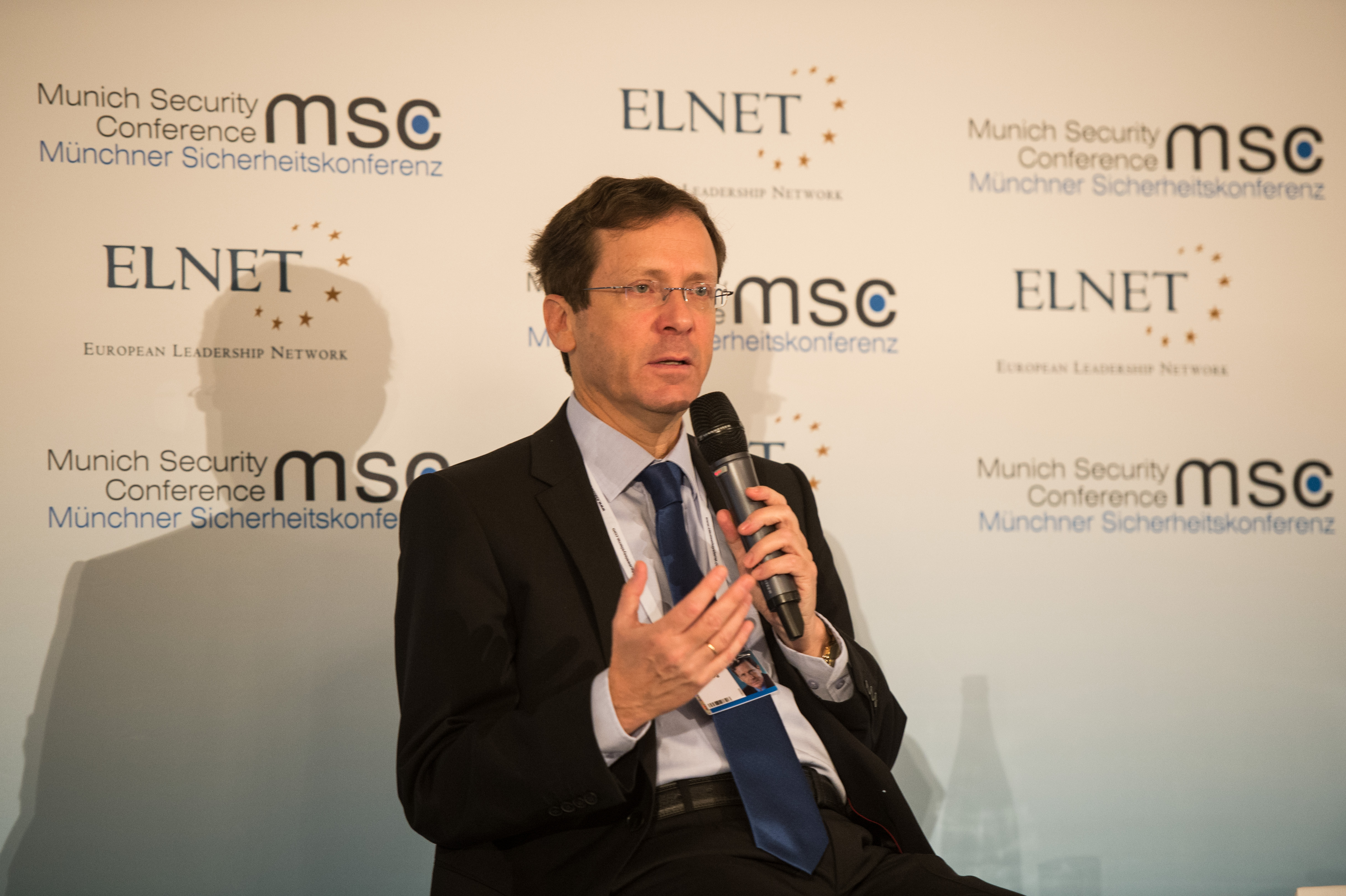
In June 2014, Herzog criticized then-Prime Minister Benjamin Netanyahu for his perceived failures in engaging with the international community, presenting a peace proposal with the Palestinians, and working effectively with US President Barack Obama. Herzog publicly stated that Netanyahu's "loathing and hostility for Barack Obama" was a significant failing that put Israel's security at risk. As the governing coalition dissolved and new elections were anticipated in March 2015, Herzog called on the Hatnua and Kadima parties to join Labor in forming a new coalition. He expressed his belief in his ability to replace Netanyahu and committed to establishing a strong political bloc before the elections. Shortly thereafter, Herzog and Tzipi Livni, who was then the justice minister and head of a centrist faction, announced they would campaign on a joint slate in the upcoming election. This joint list was named Zionist Union and aimed to prevent Netanyahu and his Likud Party from securing a fourth term as prime minister. In the 2015 Israeli legislative election, the Zionist Union won 24 seats, while Likud secured 30, making the Zionist Union the largest opposition faction.
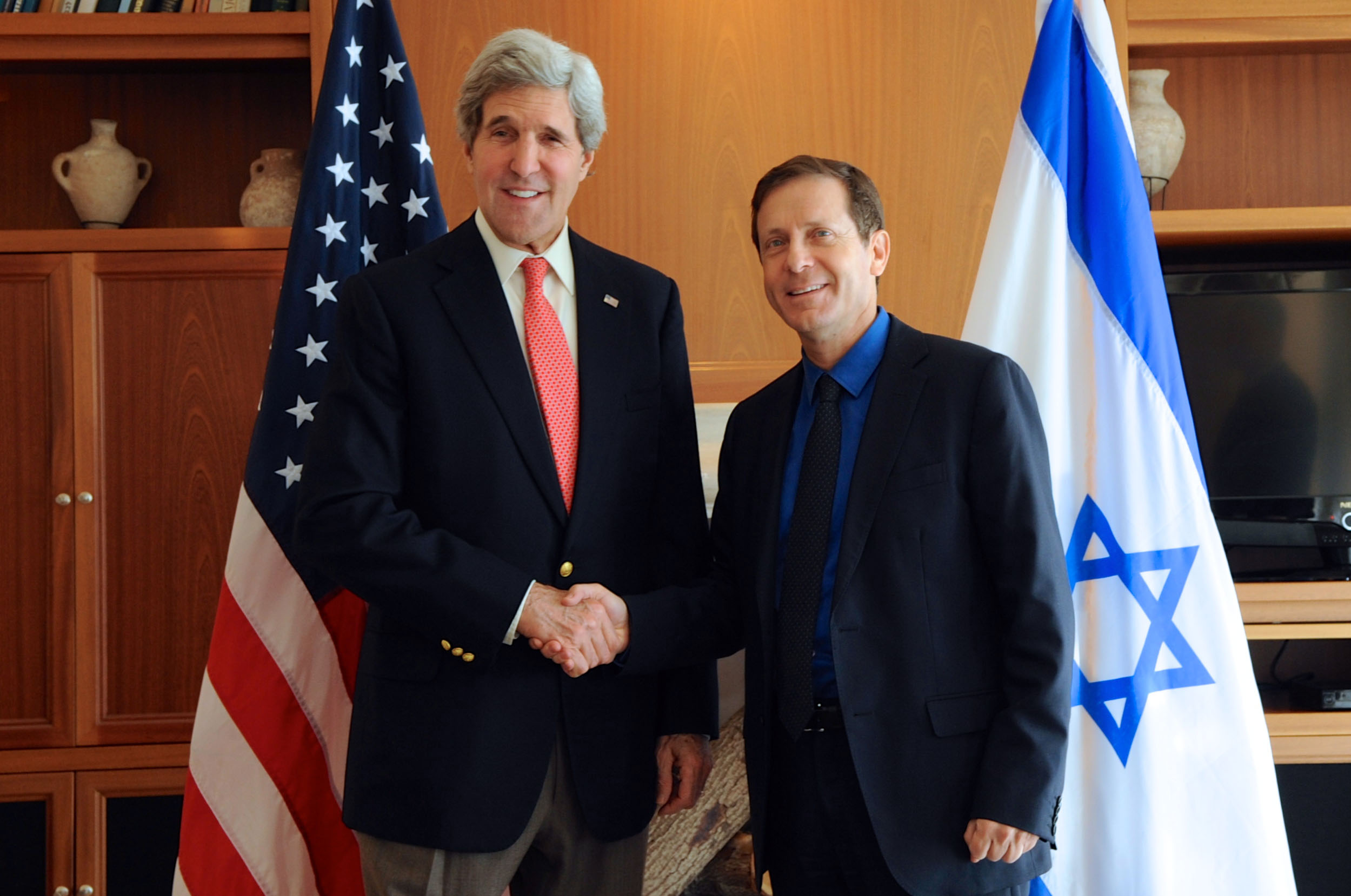
In July 2017, Herzog was eliminated in the first round of the 2017 Israeli Labor Party leadership election. Avi Gabbay went on to win the leadership elections; however, Herzog remained the official Leader of the Opposition in the Knesset, as Gabbay was not an elected member of Knesset at the time. After being elected chairman of the Jewish Agency for Israel, Herzog resigned as Leader of the Opposition and from the Knesset. Tzipi Livni succeeded him as Leader of the Opposition, while Robert Tiviaev replaced him as a Knesset member.
2.3. Chairman of the Jewish Agency
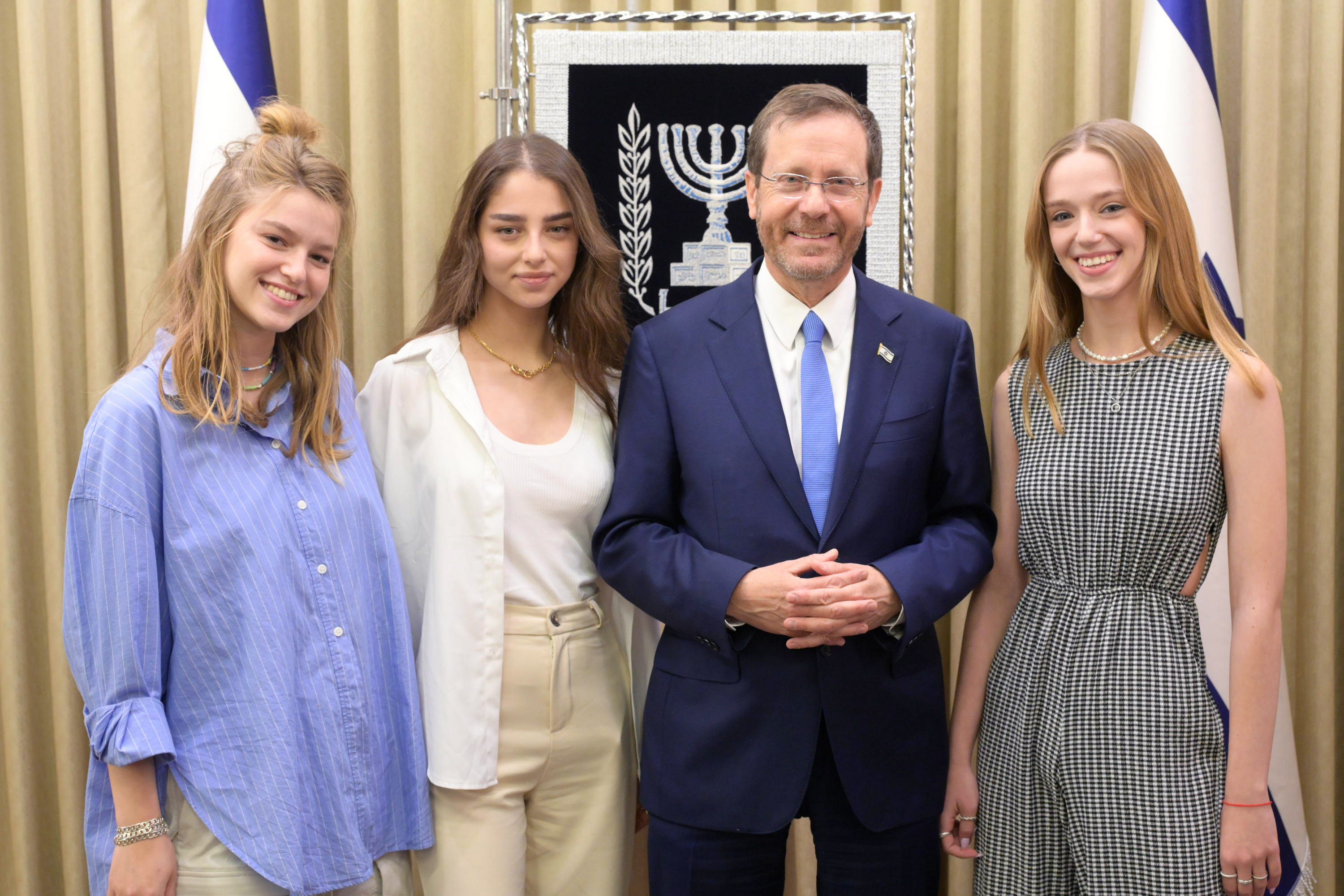
In June 2018, Isaac Herzog was unanimously elected chairman of the Jewish Agency for Israel. He set bridging the gap between the Jewish people and the State of Israel as one of his primary objectives during his tenure. In an interview, Herzog stated that he views intermarriage between Jews and non-Jews as a "plague" that requires a solution. On 24 October 2018, Herzog led a resolution to reaffirm the Jewish Agency's Board of Governors' commitment to the principles of a democratic Israel, as enshrined in its Declaration of Independence.
Following the Pittsburgh synagogue shooting, Herzog expressed deep concern over the rising antisemitism worldwide. At the International Holocaust Remembrance Day ceremony at the European Parliament in Brussels, he urged European leaders to actively combat antisemitism and adopt the International Holocaust Remembrance Alliance's working definition of antisemitism. In a landmark move in March 2019, the Jewish Agency became the first public institution in Israel to offer financial assistance to employees for surrogacy services abroad, a policy that also extended to gay and single parents, marking a step towards greater inclusivity.
3. President of Israel Tenure
3.1. Election and Inauguration
On 19 May 2021, Isaac Herzog officially announced his candidacy for the 2021 Israeli presidential election. On 2 June 2021, he was elected as the 11th president by the Knesset, securing 87 votes compared to 26 for his opponent, Miriam Peretz. This marked the highest number of votes ever received by a presidential candidate in Israel's history. He was sworn into office on 7 July 2021, becoming the first son of a former Israeli president to assume the presidency himself. Furthermore, he is the first Israeli president to have been born in Israel after the country's Declaration of Independence.
In his inaugural speech on 7 July 2021, Herzog underscored the importance of healing divides within Israeli society and building bridges between different segments of the population, as well as between Israel and the Jewish diaspora. He remarked, "We must remember that it was baseless hatred that led to the destruction of the First and Second Temples. The same baseless hatred, the same factionalism and polarization that claim such a heavy price from us-nowadays, and every day. The heaviest price of all is the erosion of our national resilience." Herzog also strongly emphasized the critical importance of confronting the climate crisis.
3.2. Major Activities and Policies
Since assuming the presidency, Herzog has undertaken numerous significant domestic initiatives and international state visits.
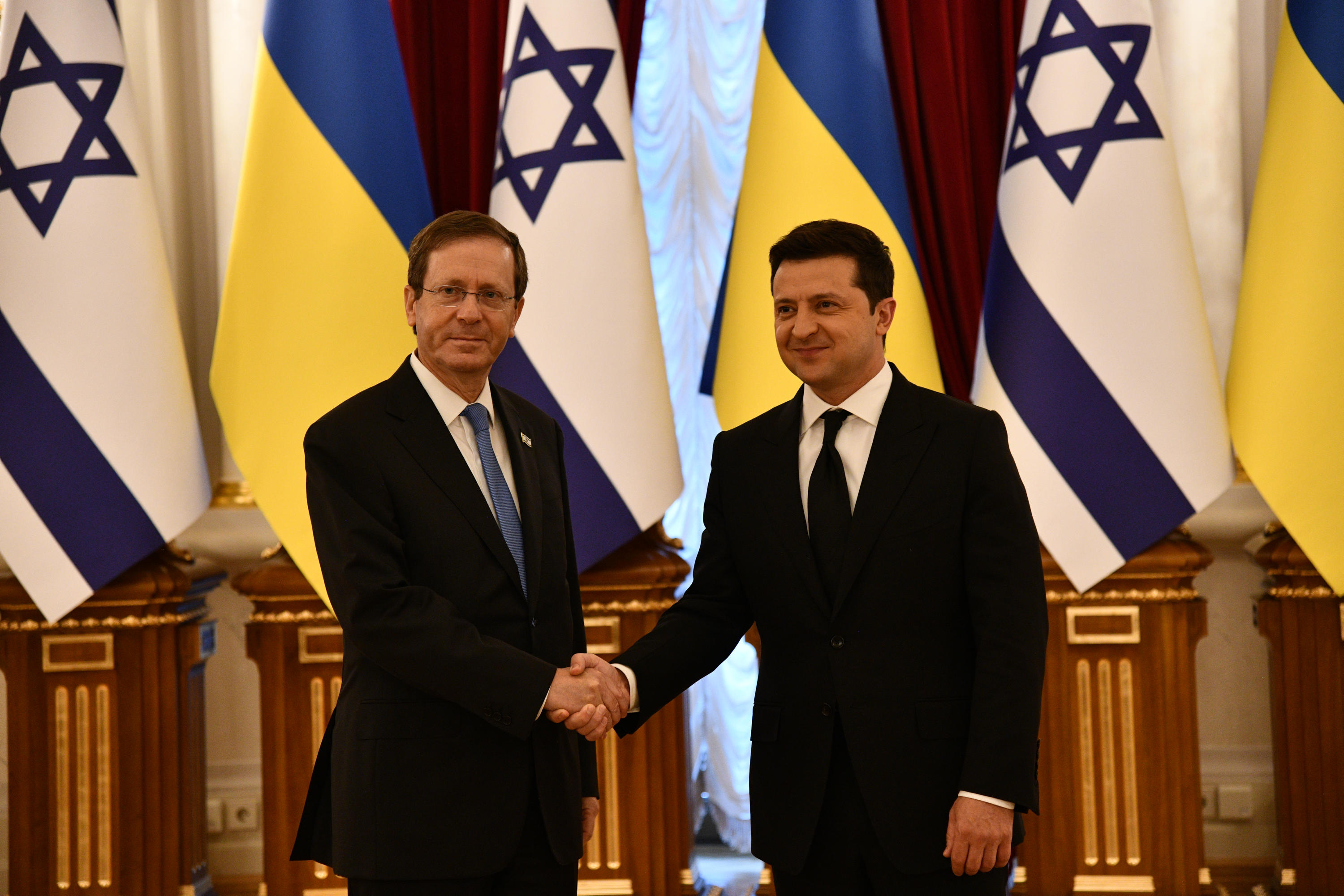
On the international stage, Herzog has engaged in extensive diplomatic efforts. On 30 January 2022, he conducted a historic state visit to the United Arab Emirates. In March 2022, he embarked on a regional tour of neighboring Mediterranean states, including Greece, Cyprus, and a state visit to Turkey alongside First Lady Michal Herzog, as guests of President Recep Tayyip Erdoğan and his wife Emine Erdoğan. This visit symbolized a desire to move beyond a period of strained relations between Israel and Turkey. During the visit, Herzog acknowledged the "baggage of the past" but emphasized that the future relationship would be defined by both states' actions. As part of a broader policy to strengthen ties with the Jewish Diaspora during foreign engagements, Herzog and his wife also visited the Jewish community in Istanbul at the Neve Shalom Synagogue, a site that has been targeted by terror attacks over the years.
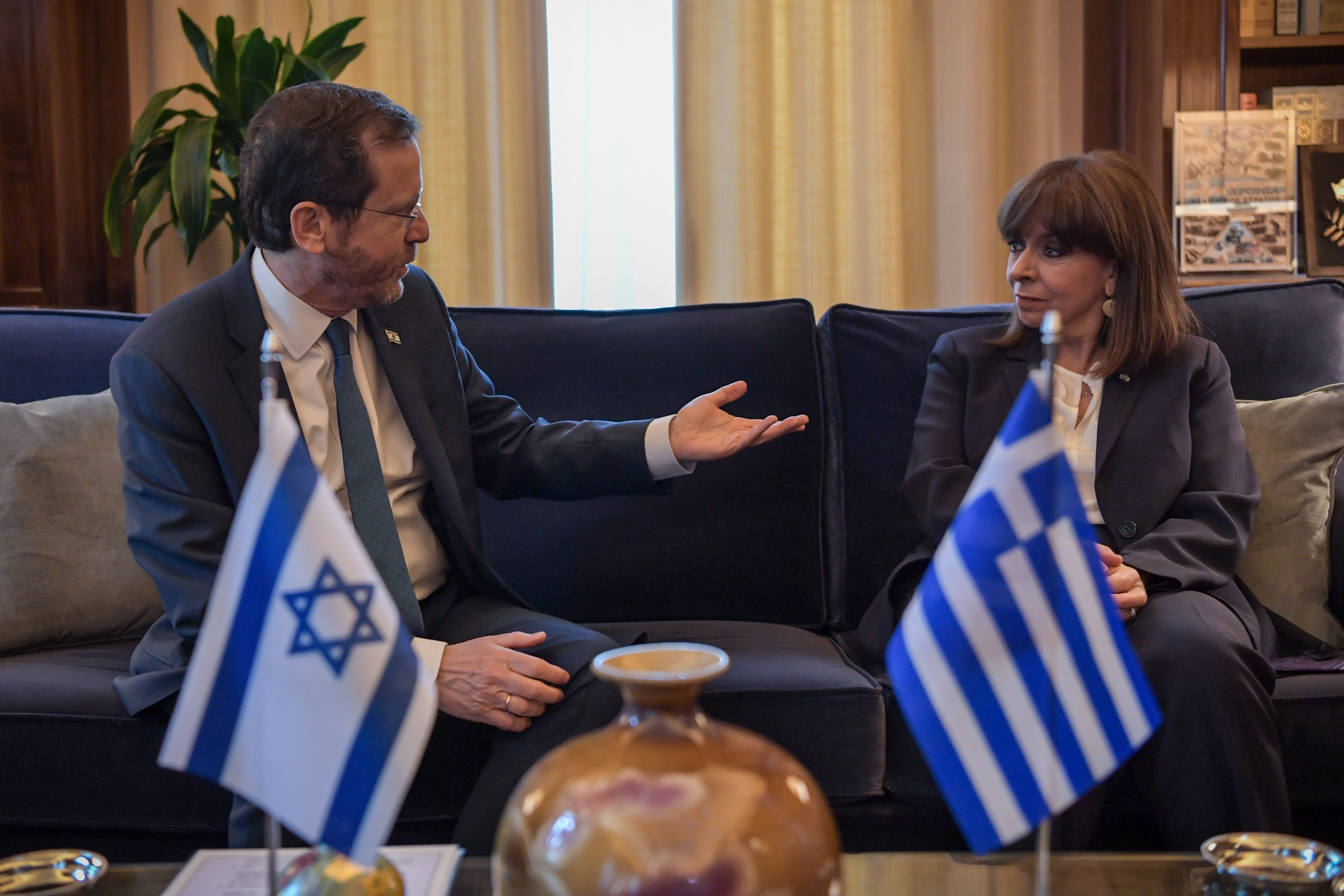
On 29 March 2022, Herzog made a historic first public visit by an Israeli leader to Amman, Jordan, where he met with King Abdullah II. Their discussions focused on deepening the Israeli-Jordanian relationship, maintaining regional stability, and promoting peace and normalization.
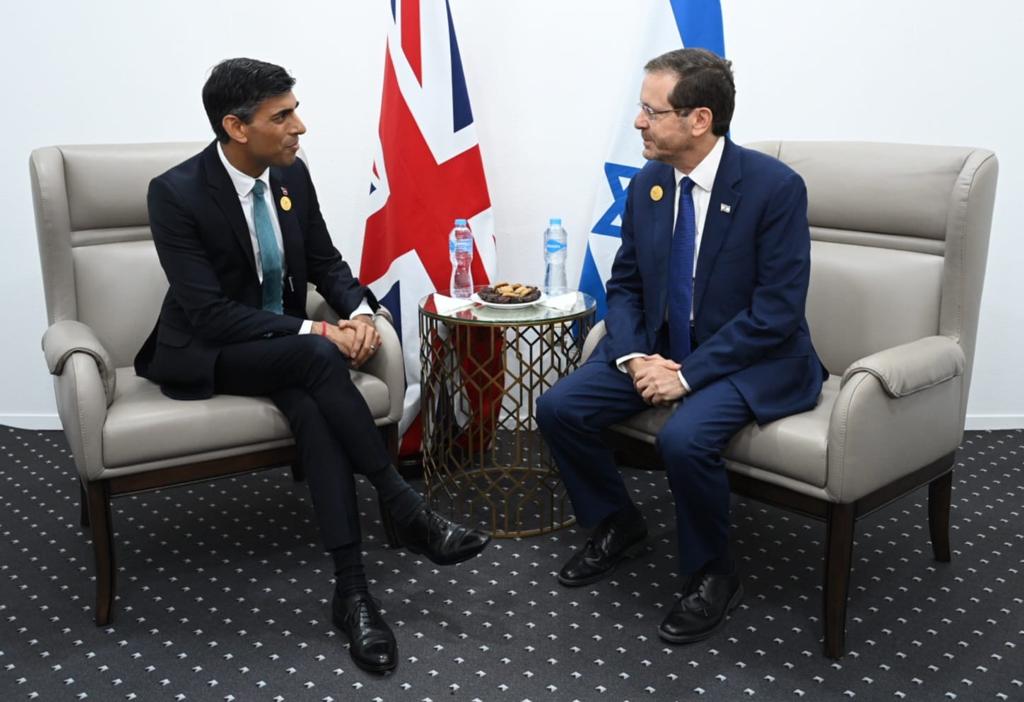
His diplomatic engagements continued with a visit to Egypt in November 2022 and to the United Kingdom, where he met with British Prime Minister Rishi Sunak. In December 2023, Herzog attended the COP28 climate summit in Dubai, United Arab Emirates, where he met with Qatar's Emir Tamim bin Hamad Al Thani. On 12 November 2024, Herzog visited Washington, D.C. for a state visit, meeting with US President Joe Biden at the White House, where he told Biden, "In the Bible, it says that Joseph will strengthen Israel. And clearly, Mr. President, you've done that."
Domestically, Herzog has initiated efforts towards social cohesion and environmental stewardship. On 29 October 2021, as part of his objective to foster dialogue within Israeli society, Herzog participated in a memorial ceremony for the victims of the Kafr Qasim massacre of 1956. He issued an apology on behalf of the State of Israel, becoming the first Israeli official to ask for forgiveness at the official ceremony in Kafr Qasim. In his speech, Herzog declared, "The killing and injury of innocents are absolutely forbidden. They must remain beyond all political arguments."
In October 2021, Herzog announced the establishment of the Israeli Climate Forum under the auspices of the Office of the President, appointing former Member of Knesset Dov Khenin as its chairman. This forum oversees various working groups and brings together public officials and private citizens to coordinate efforts to combat the climate crisis. In his "Renewable Middle East" speech at the Haaretz Climate Change Forum, Herzog outlined a vision for how the climate crisis could create opportunities for regional cooperation across the Middle East and Mediterranean Basin.
In December 2021, Herzog launched his "Think Good" campaign, a collaborative effort with Meta, aimed at combating cyberbullying and promoting respectful and inclusive discourse online. The "Voice of the People" initiative, scheduled for 2025, aims to gather diverse Jewish voices globally to discuss challenges affecting the Jewish people and translate this dialogue into actionable strategies.
However, some of Herzog's actions have drawn criticism. On 28 November 2021, he lit candles for the first night of Hanukkah at the Cave of the Patriarchs in Hebron, a move that attracted criticism from the left-wing. During his visit, Herzog stated that the recognition of the Jewish people's historical attachments to Hebron "must be beyond all controversy."
3.3. Controversies and Incidents
During his presidency, particularly amidst the Israel-Hamas war, Isaac Herzog has made several statements and faced incidents that have drawn significant international attention and controversy.
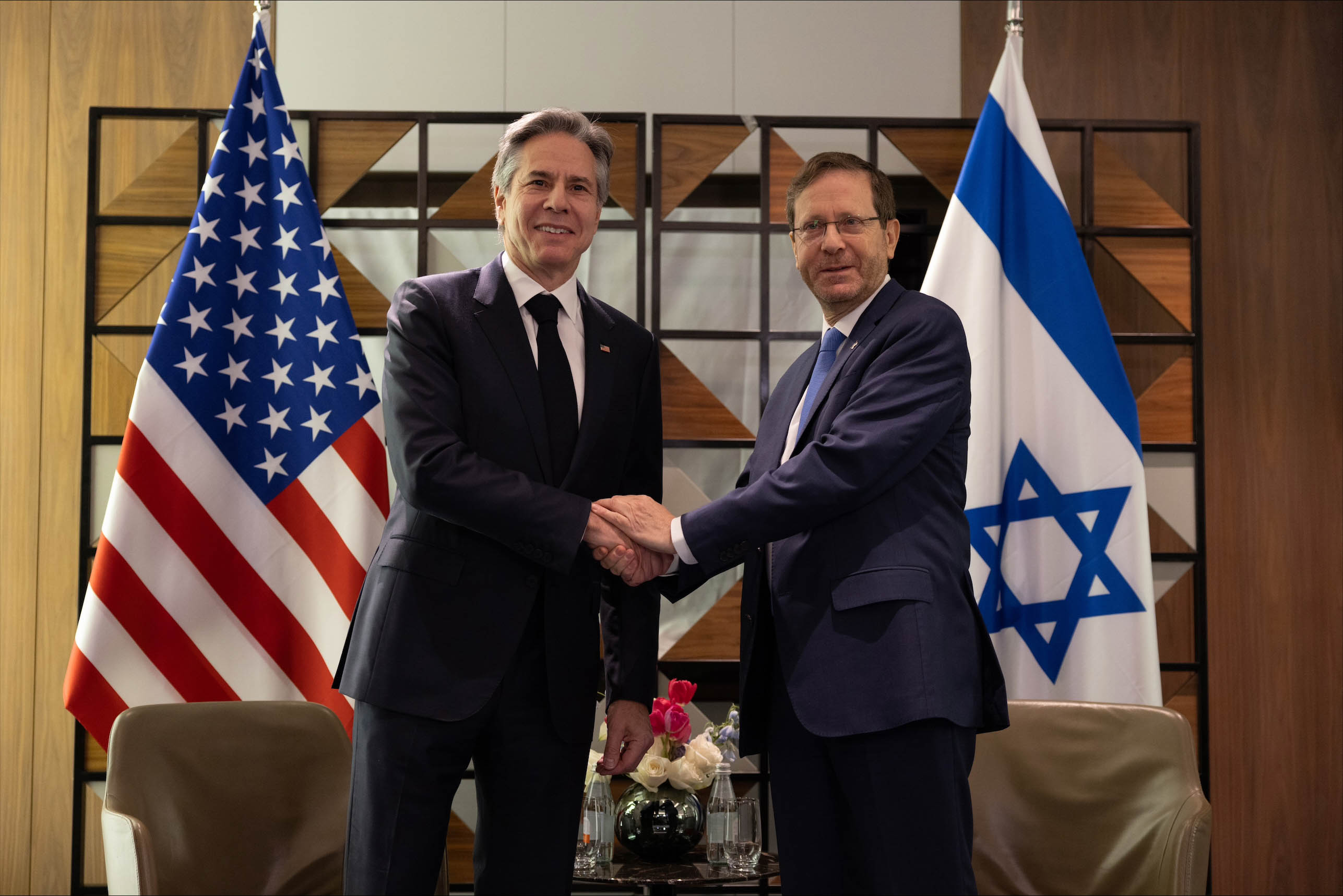
In October 2023, Herzog accused the residents of the Gaza Strip of collective responsibility for the Hamas attack on Israel, stating that there are "no innocent civilians in Gaza." On 17 October 2023, he publicly stated that accusations claiming Israel was responsible for the al-Ahli Arab Hospital explosion constituted a "21st-century blood libel." Five days later, on 22 October, he informed Britain's Sky News that Hamas fighters captured by Israel were found with instructions from al-Qaeda on how to manufacture chemical weapons, including a chemical bomb, adding that Israel was "dealing with ISIS, al-Qaeda and Hamas."
In January 2024, during Herzog's visit to the World Economic Forum in Switzerland, the Swiss Federal Prosecutor's Office announced that it was investigating a criminal complaint filed against him. While the specific nature of the complaint was not disclosed, it is widely believed to be related to the ongoing Israel-Hamas war. In February 2024, Herzog characterized South Africa's genocide case against Israel at the International Court of Justice (ICJ) as a "blood libel" against Jews. On 28 March 2024, Herzog affirmed his view that US President Joe Biden is a "great friend of Israel."
In September 2024, Herzog denied any Israeli involvement in the 2024 Lebanon pager explosions. On 21 November 2024, following the issuance of arrest warrants by the UN-backed International Criminal Court (ICC) for Israeli Prime Minister Benjamin Netanyahu and former Defence Minister Yoav Gallant, Herzog condemned the ICC's decision. He stated, "It ignores Hamas's cynical use of its own people as human shields. It ignores the basic fact that Israel was barbarically attacked and has the duty and right to defend its people. It ignores the fact that Israel is a vibrant democracy, acting under international humanitarian law, and going to great lengths to provide for the humanitarian needs of the civilian population." Herzog's statement did not include a mention of the ICC's simultaneous indictment of three Hamas leaders, all of whom had reportedly been killed by Israeli strikes by that time.
4. Personal Life
Isaac Herzog is married to Michal Herzog, who is also a lawyer. Together, they have three sons. The family resides in Herzog's childhood home, located in the Tzahala neighborhood of Tel Aviv.
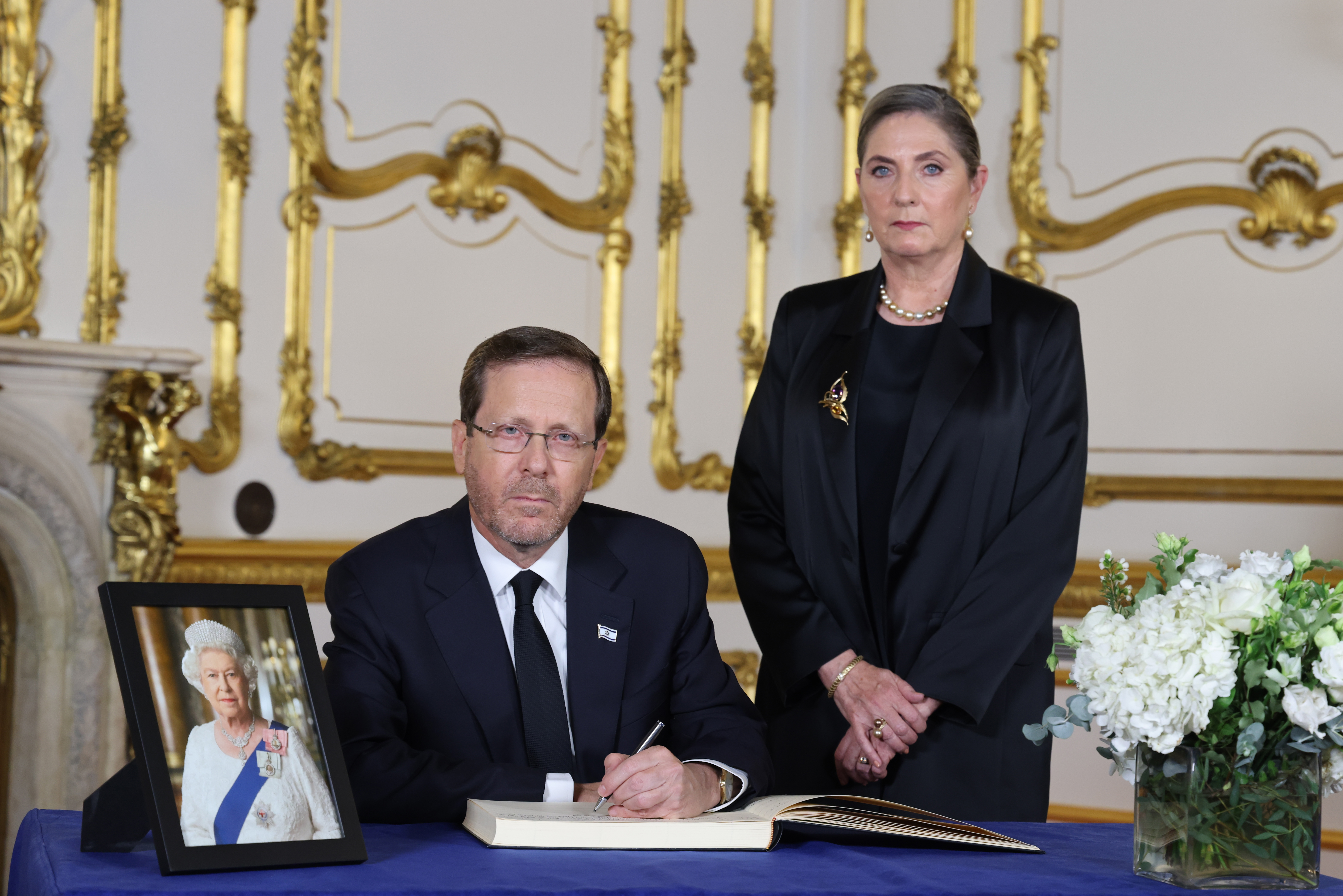
5. Assessment and Legacy
5.1. Positive Assessment
Herzog is recognized for his persistent efforts towards fostering social cohesion and unity within Israel, a theme he prominently highlighted in his inaugural presidential speech. His apology on behalf of the State of Israel for the 1956 Kafr Qasim massacre marked a significant gesture towards reconciliation with the Arab-Israeli community, emphasizing the inviolability of innocent lives.
His tenure as Chairman of the Jewish Agency for Israel demonstrated a commitment to bridging gaps between Israel and the Jewish diaspora, and his organization's support for surrogacy services for gay and single parents was a notable step towards inclusivity within Jewish institutions. Furthermore, his "Think Good" campaign against cyberbullying underscores his focus on promoting respectful online discourse.
On the environmental front, Herzog has proactively addressed the climate crisis by establishing the Israeli Climate Forum and advocating for a "Renewable Middle East," aiming to transform environmental challenges into opportunities for regional cooperation. His diplomatic outreach to various countries, including the UAE, Turkey, and Jordan, has been seen as instrumental in strengthening Israel's regional and international standing.
5.2. Criticism
Despite his efforts, Herzog has faced criticism, particularly concerning his controversial statements during the Israel-Hamas war. His remarks accusing residents of the Gaza Strip of collective responsibility for the Hamas attack and stating that there were "no innocent civilians in Gaza" have drawn international condemnation, notably being cited by South Africa in its genocide case against Israel at the International Court of Justice. Similarly, his claims about Hamas fighters carrying instructions for chemical weapons and his characterization of accusations regarding the al-Ahli Arab Hospital explosion as "blood libel" have been highly contentious.
His lighting of Hanukkah candles at the Cave of the Patriarchs in Hebron also drew criticism from left-wing circles, who viewed it as a politically charged act in a sensitive area. Furthermore, the criminal complaints filed against him in Switzerland related to the Israel-Hamas war, and his strong condemnation of the International Criminal Court's arrest warrants for Israeli leaders, have raised concerns about his stance on international legal accountability and human rights. His earlier comment describing intermarriage between Jews and non-Jews as a "plague" also drew negative reactions from some quarters.
